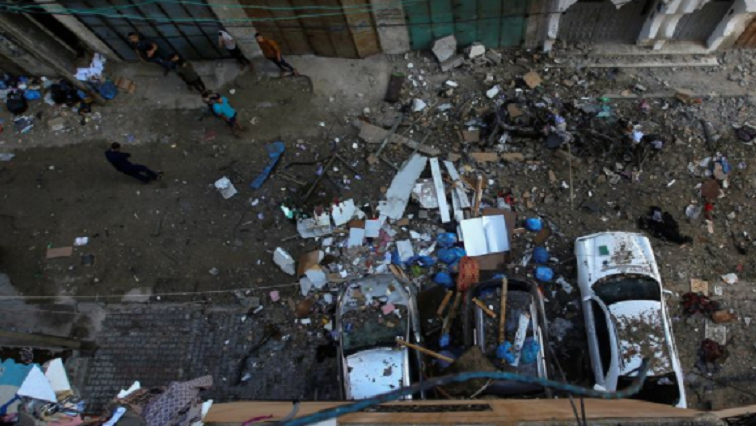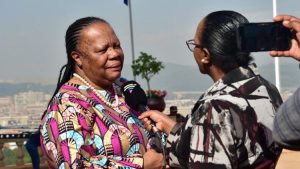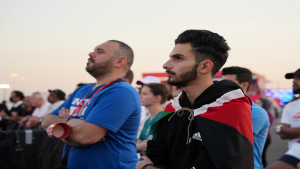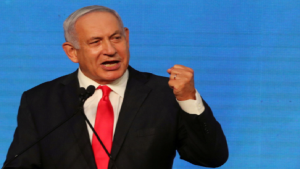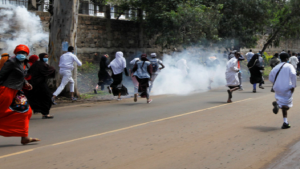White House Press Secretary Jen Psaki said on Saturday that the United States had told Israel to ensure the “safety and security of journalists” after the Israeli military destroyed a Gaza tower block housing media offices.
“We have communicated directly to the Israelis that ensuring the safety and security of journalists and independent media is a paramount responsibility,” Psaki wrote on Twitter.
We have communicated directly to the Israelis that ensuring the safety and security of journalists and independent media is a paramount responsibility.
— Jen Psaki (@PressSec) May 15, 2021
Israel pounded Gaza with air strikes and Palestinian militants launched rocket salvoes at Tel Aviv and other cities on Saturday, with no sign of an end to almost a week of fighting. The death toll is rising from the worst escalation since 2014 and diplomacy has so far failed to quell it.
Israel’s military destroyed a tower block in Gaza City on Saturday that housed the US Associated Press and Qatar-based Al-Jazeera media operations, as well as other offices and apartments.
Israel gave advance warning of the strike so it could be evacuated, saying the target contained military assets of Hamas, the Islamist group that runs Gaza.
AP President and CEO Gary Pruitt says he’s “shocked and horrified that the Israeli military would target and destroy the building housing AP’s bureau and other news organizations in Gaza.” Pruitt says AP is seeking information from the Israeli government. https://t.co/0s22koImto
— The Associated Press (@AP) May 15, 2021
Discussion on the strike on media houses:
In Tel Aviv, residents fled for cover amid wailing sirens as Hamas militants fired barrages of rockets. One hit a residential block in the Ramat Gan suburb, killing a 50-year old man, medics said. The group said the salvoes responded to overnight strikes on Gaza’s Beach refugee camp, where a woman and four of her children were killed when her house was hit. Five others died, medics said.
Israel said it targeted an apartment used by Hamas.
Palestinians say at least 139 people, including 39 children, have been killed in Gaza since the conflict erupted on Monday. Israeli medics have reported 10 dead, including two children, and said six people were in critical condition.
Hamas launched Monday’s assault after tensions over a court case to evict several Palestinian families in East Jerusalem and in retaliation for Israeli police clashes with Palestinians near the city’s al-Aqsa Mosque, Islam’s third holiest site. Strikes have lit up Gaza’s night sky since the fighting began.
Akram Farouq, 36, dashed out of his home overnight with his family after a neighbour told him they had received a call from an Israeli officer saying their building would be hit – a familiar pattern for attacks on what Israel deems military sites. “We haven’t slept all night because of the explosions, and now I am out in the street with my wife and children, who are weeping and trembling,” Farouq said.
Israelis have learned to dive for cover at any time of the night and day. In Israel’s coastal city of Ashdod, Mark Reidman surveyed damage to his apartment building from a rocket hit.
“We want to live in peace and quiet,” the 36-year-old said, adding he had to try to explain to his three young children “what happened, and why this is happening”.
Seeking a ceasefire
Regional and international diplomatic efforts have yet to show any signs of halting hostilities. US President Joe Biden’s envoy Hady Amr, deputy assistant secretary for Israel and Palestinian affairs, arrived in Israel on Friday, before a meeting on Sunday of the UN Security Council.
The US Embassy said in a statement that the envoy aimed “to reinforce the need to work toward a sustainable calm”. Egypt, which shares a border with Gaza and has led regional diplomatic efforts, has been pushing for a ceasefire so talks could start, two Egyptian security sources said on Friday.
Hostilities between Israel and Gaza have been accompanied by violence in Israel’s mixed communities of Jews and Arabs. Synagogues have been attacked, Arab-owned shops vandalised and street fights have broken out.
Israel’s president, who has a largely ceremonial role, has warned of civil war. Palestinian casualties also extend beyond Gaza.
Palestinians, who each year on May 15 mark Nakba or “Catastrophe” Day – their displacement in the 1948-49 war that accompanied the creation of the modern state of Israel – have reported 11 people killed this week in the occupied West Bank after protesters and Israeli forces clashed.
The conflict adds complexity to Israel’s fractious politics. It has dealt a blow to opposition attempts to unseat Prime Minister Benjamin Netanyahu, when a potential right-wing partner scrapped coalition talks after violence erupted. This may mean Israelis face a fifth election in just over two years.
Living conditions for Gaza’s two million people are worsening, with households receiving just four hours a day of power instead of the usual 12, after lines from Israel and Gaza’s sole power station were damaged, officials said. Fuel was also running low.
Israel said on Saturday about 2 300 rockets had been fired from Gaza at Israel since Monday, with about 1 000 intercepted by missile defences and 380 falling into the Gaza Strip.


